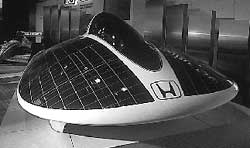Fuels for the future
 Alternatives hold the key to the future of the automobile industry. There is tremendous potential both in terms of performance as well as reduced health risks. But the automobile sector has failed to show any real interest in these fuels. Consider this: the use of alternative fuels can reduce the risk of cancers by as much as 90 per cent. They are much more fuel-efficient and require less maintenance. Yet alternative fuels constitute less than one per cent in the automobile segment. Today there are many alternatives: compressed natural gas (cng), liquefied petroleum gas (lpg), methanol, hydrogen fuels, electricity, solar energy and bio-diesel. And the advantages are many:
Alternatives hold the key to the future of the automobile industry. There is tremendous potential both in terms of performance as well as reduced health risks. But the automobile sector has failed to show any real interest in these fuels. Consider this: the use of alternative fuels can reduce the risk of cancers by as much as 90 per cent. They are much more fuel-efficient and require less maintenance. Yet alternative fuels constitute less than one per cent in the automobile segment. Today there are many alternatives: compressed natural gas (cng), liquefied petroleum gas (lpg), methanol, hydrogen fuels, electricity, solar energy and bio-diesel. And the advantages are many:
natural gas: Natural gas exists in the gaseous state at normal temperature and pressure, and is found in two forms: cng and lpg. Compared to diesel and petrol, cng causes substantially lower pollution without affecting the vehicle's performance. The exhaust level of co2 in a cng vehicle is about 40 per cent lower than that of petrol or diesel engine. Even sulphur and lead-related emissions are eliminated, as it is absent in the fuel.
Though the self-ignition temperature of cng is much higher than petrol, it is still safe due to its low inflammability nature. It is one of the cleanest-burning fuels as it emits about 70 per cent less carbon monoxide and has much less ozone-forming potential than standard petroleum gasoline. It is also less expensive than petrol and diesel in India.
liquified petroleum gas: Similar to cng, the range on lpg is somewhat less than that of comparable petrol-powered vehicles, though power, acceleration, payload and cruise speed are comparable with those obtained with an equivalent internal-combustion engine. Most of the environmental benefits of cng, including high octane, are present in lpg. In terms of safety, lpg has an advantage over cng, since its tank does not have to be pressurised and the fuel is stored as a liquid.
alcohol (methanol and ethanol): At present, Ethanol is being considered a very viable replacement for the conventional fuels in the Internal Combustion (ic) engines. However, methanol is being considered more for its use in the fuel cells rather than in ic engines. The benefits of using ethanol include its renewable nature and lower emissions than the conventional petroleum based fuels.
hydrogen: Hydrogen provides a means of obtaining a portable and clean fuel from non-fossil source and from energy sources such as solar, geo-thermal and nuclear and is considered a very promising candidate. It can be obtained from water using non-conventional energy sources, and thus has tremendous potential to become the cleanest source of energy. It recycles rapidly and cleanly from hydrogen to water. It is a clean burning fuel and provides potential environmental benefits (almost zero pollution). It also provides high-energy conversion processes in almost all uses and is compatible with essentially all energy uses.
A Spark Ignition (si) engine designed specifically for hydrogen fuel could give efficiencies much higher (up to 1.5 times) than those obtainable with petrol. Compression Ignition (ci) engine operation with liquid hydrogen is the best configuration for development.
electric vehicles (evs): They have a clear advantage over conventional fuelled vehicles in terms of nil tail-pipe emissions. evs have relatively high initial capital cost. However, subsequently the "fuel' and maintenance costs are low. The cost of an equivalent amount of fuel for evs is less than the price of petrol. Also, maintenance for evs is less since evs have fewer moving parts to service and replace.
Alternative technology
Many in the auto industry believe that the era of alternatives to ic engine is about to dawn. This is because futuristic fuel cells engine and electric cars are slowly inching towards commercial viability and hybrid vehicles have already achieved a high degree of success in Japan. Like hybrid, fuel cell is also another ecofriendly option. In principle, a fuel cell operates like a battery. It has the potential to be substantially more efficient than a conventional ic engine. One of the major advantages of fuel cell is that while current internal combustion engines have efficiency in the range of 20 per cent, the fuel cells efficiency is generally above 30 per cent.
There are certain inherent disadvantages in alternative fuels and there is need to promote and develop the sector. But there is no denying that alternative fuel operated on alternative fuel vehicles will soon become a common sight in the automobile industry due to improved efficiency and reduced emissions. While some countries in Europe are moving in this direction, the initiative is yet to gain momentum in India. This is mainly because the industry has not been proactive in switching to cleaner fuels. The blame is also on the Union government, which has played into the hands of the petrol/diesel lobby to frustrate any attempts to bring about any real change.
Related Content
- Financing coal phase-out: public development banks’ role in the early retirement of coal plants
- 2022 year in review: climate-driven global renewable energy potential resources and energy demand
- The evolution of energy efficiency policy to support clean energy transitions
- Clean electricity within a generation: Paris-aligned benchmarks for the power sector
- Carbon pricing and fossil fuel subsidy rationalization tool kit
- Oil 2023: analysis and forecast to 2028
